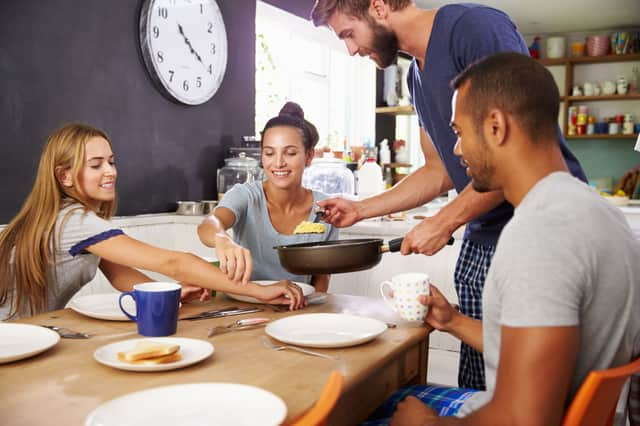This is how to self-isolate if you live in a shared home


People who show “even minor” signs of respiratory tract infections or a fever will soon be told to self-isolate in an effort to tackle the coronavirus outbreak. The UK government’s chief medical adviser said the change in advice could happen within the next 10 to 14 days.
The best place to self-isolate is within your home, where you should stay for the duration of your quarantine. However, for people living in house shares, is it possible to self-isolate when you share a kitchen, bathroom and other communal spaces with flatmates?
How to avoid putting your housemates at risk
Advertisement
Hide AdAdvertisement
Hide AdThe Government advice on self-isolation says you should stay in a "well-ventilated room with a window to the outside that can be opened, separate from other people in your home. Keep the door closed." If you live in a flat share, that means staying in your room as much as possible.
The NHS has also issued advice on how to self-isolate if you are living in shared accommodation:
- Stay in your room with the door closed, only using communal kitchens, bathrooms and living areas when necessary- Avoid using a shared kitchen while others are using it- Take your meals back to your room to eat- Use a dishwasher (if available) to clean and dry your used crockery and cutlery. If this is not possible, wash them by hand using detergent and warm water and dry them thoroughly, using a separate tea towel- The government also advises to use a separate bathroom from the rest of the household. However if you have to share these facilities, regular cleaning will be required
What to do if only one person has been isolated
“If a separate bathroom is not available, consideration should be given to drawing up a bathroom rota for washing or bathing, with the isolated person using the facilities last, before thoroughly cleaning the bathroom themselves (if able or appropriate),” reads the government website.
Advertisement
Hide AdAdvertisement
Hide Ad“Ensure the isolated person uses separate towels from other household members, both for drying themselves after bathing or showering and for hand hygiene purposes.”
The guidance also states that you should stay in your room with the door closed, only coming out when necessary, wearing a face mask if one has been issued to you.
"If these recommendations cannot be implemented, then home isolation should be avoided," says the government.
You should also not share dishes, drinking glasses, cups, eating utensils, towels, bedding or other items with other people in your home when you have already used them.
Advertisement
Hide AdAdvertisement
Hide AdIf you’re not sure whether you should be self-isolating, check your symptoms and call 111, if you’re concerned. Don’t turn up at your GP if you’re displaying symptoms.
Coronavirus: the facts
What is coronavirus?
COVID-19 is a respiratory illness that can affect lungs and airways. It is caused by a virus called coronavirus.
What caused coronavirus?
The outbreak started in Wuhan in China in December 2019 and it is thought that the virus, like others of its kind, has come from animals.
How is it spread?
As this is such a new illness, experts still aren’t sure how it is spread. But.similar viruses are spread in cough droplets. Therefore covering your nose and mouth when sneezing and coughing, and disposing of used tissues straight away is advised. Viruses like coronavirus cannot live outside the body for very long.
What are the symptoms?
Advertisement
Hide AdAdvertisement
Hide AdThe NHS states that the symptoms are: a dry cough, high temperature and shortness of breath - but these symptoms do not necessarily mean you have the illness. Look out for flu-like symptoms, such as aches and pains, nasal congestion, runny nose and a sore throat. It’s important to remember that some people may become infected but won’t develop any symptoms or feel unwell.
What precautions can be taken?
Washing your hands with soap and water thoroughly. The NHS also advises to cover your mouth and nose with a tissue or your sleeve (not your hands) when you cough or sneeze; put used tissues in the bin immediately and try to avoid close contact with people who are unwell. Also avoiding touching eyes, nose and mouth unless your hands are clean.
Should I avoid public places?
Most people who feel well can continue to go to work, school and public places and should only stay at home and self isolate if advised by a medical professional or the coronavirus service.
What should I do if I feel unwell?
Don’t go to your GP but instead call NHS 111 or look online at the coronavirus service that can tell you if you need medical help and what to do next.
When to call NHS 111
Advertisement
Hide AdAdvertisement
Hide AdNHS 111 should be used if you feel unwell with coronavirus symptoms, have been in a country with a high risk of coronavirus in the last 14 days or if you have been in close contact with someone with the virus.
Sources: World Health Organisation and NHS